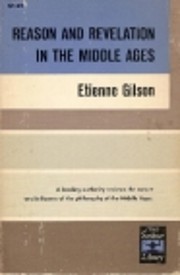

Fai clic su di un'immagine per andare a Google Ricerca Libri.
|
Sto caricando le informazioni... Reason and Revelation in the Middle Ages (edizione 1951)di Etienne Gilson
Informazioni sull'operaReason and Revelation in the Middle Ages di Étienne Gilson
 Favourite Books (1,689) Sto caricando le informazioni...
Iscriviti per consentire a LibraryThing di scoprire se ti piacerà questo libro. Attualmente non vi sono conversazioni su questo libro.  A solid, quick read about different ways to conceive the relationship between philosophy and theology, with, as the title cunningly suggests, the middle ages as a focus. The most interesting idea here was that there is a kind of tradition of Christian thinkers using the cutting edge extra-theological thought of their time to do theology, starting with Augustine and his Platonism, and moving on to, e.g., Anselm and his logic. It's no coincidence that these gentlemen tend to be the most interesting of Christian thinkers (just as non-Christian thinkers who use Christian resources tend to be the most interesting of non-Christians thinkers). It's a shame that Gilson didn't accept what his categories demand, i.e., that Aquinas was, with his Aristotle, one of these men, and not sui generis. That doesn't do much harm to Gilson's main point, which is that Aquinas found the best solution to the problem of reason and revelation in his time, and that if you care about the problem, you should care about him. I did not choose wisely. The book is divided into three chapter (lectures) and after the first I went MEGO and I rushed through the rest of the book because I wanted to break a monthly reading quota. The book isn’t dull, it’s interesting and informative, and the central premise is one worth considering- there are two paths to wisdom: Reason and revelation. I just sat in the back of the room and daydreamed and now it’s exam day. Reason is wisdom obtained through logic and revelation the Divine word. St. Augustine provided for both when he said that in order to understand, you must first believe then the rest will be revealed to you if you seek it. (The fear of G-d is the beginning of wisdom.) The two are not intrinsically exclusive, but a schism has been long-standing and sometime during the early Renaissance the discussion was abandoned and secularism gained moved to the fore. I’ll go back to this one day, maybe pair it with Snow’s ‘The Two Cultures.’ Do not do as I, dear reader, and plow through to meet a quota. As Yoda said, Do or do not, there is no try. Not just pretty words. nessuna recensione | aggiungi una recensione
Appartiene alle Collane EditorialiThe Scribner Library (SL37)
Etienne Gilson, French historian and philosopher, was born in 1884. Member of the French Academy and Director of the Institute of Medieval Studies at Toronto, he is the author of, among many brilliant works, The Spirit of Medieval Philosophy and The Unity of Philosophical Experience. Non sono state trovate descrizioni di biblioteche |
Discussioni correntiNessunoCopertine popolari
 Google Books — Sto caricando le informazioni... Google Books — Sto caricando le informazioni...GeneriSistema Decimale Melvil (DDC)189Philosophy and Psychology Ancient, medieval and eastern philosophy Early Christian and MedievalClassificazione LCVotoMedia: (4.21) (4.21)
Sei tu?Diventa un autore di LibraryThing. |
||||||||||||||||||||||||||||||||||||||||||||||||||||||||||||||||||||||||||||||||||||||||||||||||||||||||||||||||||||||||||||||||||||||||